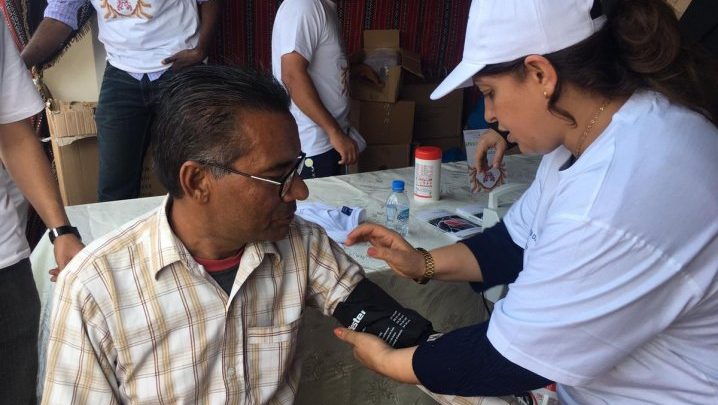
CDC screened more than 11,000 patients for tuberculosis in 2018
فحص السُّل لأكثر من 11 ألف مريض عام 2018
Doha: Hamad Medical Corporation’s (HMC) Communicable Disease Center (CDC) has screened nearly 11,500 people for tuberculosis (TB) in 2018.
In recognition of World Tuberculosis Day, observed on March 24, the CDC’s Medical Director says the organization is continuing to work to educate the community about TB as part of ongoing efforts to eradicate the disease.
“The CDC is the region’s first hospital dedicated to the diagnosis, treatment, and prevention of infectious diseases and in 2018 we screened nearly 11,500 patients for TB who were referred from HMC facilities, primary care centers, the Medical Commission, private hospitals, and Qatar Red Crescent health centers,” said Dr Muna Al Maslamani, Medical Director of the CDC.
“At the CDC, we have a highly specialised medical team that provides consultations and treatment for patients who either have TB or may have been exposed to the disease,” added Dr Al Maslamani.
In 2018 there were a total of 1,271 admissions to the CDC’s specialised TB wards – an increase of more than 70 percent from 2017. Dr Al Maslamani said the increase in TB patients is a result of the country’s growing population and greater awareness about the condition.
“We continue to expand our services and to educate the community about TB and how it is transmitted,” said Dr. Al Maslamani.
“The key to fighting the spread of TB is to remove the stigma attached to the disease through providing education and accurate information about how it can be acquired.”
“We have come a long way in terms of awareness and knowledge about TB but there is still much to be done to raise public awareness of TB, both in Qatar and internationally. The more we educate people about risk factors and prevention, the greater the chance we have to eliminate it,” said Dr Al Maslamani.
Tuberculosis remains an epidemic in much of the world, causing nearly 1.7 million deaths each year, mostly in developing countries.
The contagious infectious disease usually attacks the lungs but can also spread to other parts of the body, including the brain and spine. A type of bacteria called Mycobacterium tuberculosis causes the disease.
The disease is classified as latent TB or active TB, with signs and symptoms of active TB including a cough that lasts three or more weeks, coughing up blood, chest pain, unintentional weight loss, fatigue, and night sweats.
In recognition of World Tuberculosis Day clinicians from the CDC held an awareness campaign on the Corniche, providing members of the public with information about TB and conducting basic health checks.
This week awareness events were also several HMC hospitals.
خضع نحو 11.500 شخص لفحوصات السُّل (الدرن) في مركز الأمراض الانتقالية بمؤسسة حمد الطبية في العام 2018.
وبمناسبة حلول اليوم العالمي للسُّل، الذي يوافق الرابع والعشرين من شهر مارس، أكّدت الدكتورة منى المسلماني -المدير الطبي لمركز الأمراض الانتقالية- أن المؤسسة تواصل مساعيها بهدف تثقيف أفراد المجتمع حول مرض السُّل، في إطار الجهود المبذولة للقضاء على هذا المرض.
وقالت الدكتورة منى المسلماني: «يُعدّ مركز الأمراض الانتقالية أول مستشفى متخصص في تشخيص الأمراض المُعدية وعلاجها والوقاية منها في المنطقة، حيث تمكّنّا في العام 2018 من إجراء فحوصات السُّل لقرابة 11.500 مريض، وذلك بعد تحويلهم من مرافق مؤسسة حمد الطبية، ومراكز الرعاية الصحية الأولية، والقومسيون الطبي، والمستشفيات الخاصة، فضلاً عن المراكز الصحية التابعة للهلال الأحمر القطري».
وبلغ العدد الإجمالي للمرضى الذين تم إدخالهم إلى الأقسام الداخلية المخصصة لعلاج مرض السُّل في مركز الأمراض الانتقالية، 1271 مريضاً في عام 2018، بزيادة تتجاوز الـ 70 % عن العام 2017.
وتابعت الدكتورة المسلماني حديثها قائلة: «جهودنا مستمرة لتوسعة خدماتنا وتثقيف المجتمع حول مرض السُّل وكيفية انتقاله. فالعامل الرئيسي في مكافحة انتشار مرض السل يتمثل في التخلص من الإحساس بالحرج الاجتماعي المرتبط بالمرض، عبر توفير التثقيف ومعلومات دقيقة عن كيفية انتقاله».



